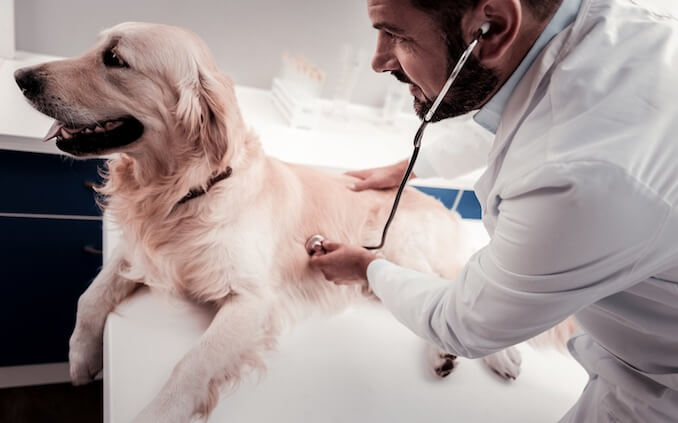Are your visits to the vet as fruitful as they could be? While we are obviously anxious to know if our dogs have health problems, are we doing everything we can to ensure our pups stay fit, healthy and happy? Here are a few questions you should ask your vet the next time you’re in their office.
 When we take our dogs to the vet (after a considerable struggle, in my case), we are so eager to learn that our pets are in great shape that we may not be vigilant about asking the doctor what more we can do to maintain our pets’ excellent health. Although our dogs may be doing well now, is it because of our lifestyle choices, or is it just luck? The next time you’re at the vet, here are a few questions you should ask to make sure everything about your dog’s health is being addressed.
When we take our dogs to the vet (after a considerable struggle, in my case), we are so eager to learn that our pets are in great shape that we may not be vigilant about asking the doctor what more we can do to maintain our pets’ excellent health. Although our dogs may be doing well now, is it because of our lifestyle choices, or is it just luck? The next time you’re at the vet, here are a few questions you should ask to make sure everything about your dog’s health is being addressed.
- Is my dog getting the right kind of exercise? Exercise – in the correct quantities – is essential for the overall health of any dog breed. However, the most basic forms of exercise like running and jumping might not be good for certain breeds because they may be more vulnerable to joint damage. So, before you enter your dog into any agility contests, ask your vet about the ideal – and not-so-ideal – exercises.
- Is my dog a healthy weight? Your vet will most likely tell you when your pup is packing a few unneeded pounds, but it doesn’t occur to many owners that a dog that seems slim might actually be a bit too plump underneath their fur. Additionally, the numbers on the scale don’t always tell the whole story. Your vet can examine your dog physically and see if they are carrying excess weight around the midsection.
- What should my dog’s diet be? Many nutrition-based health concerns can be corrected with the right diet, including obesity, digestive issues and DCM. Zignature and Castor & Pollux Organix are good pet food brands, but your vet will also have specific recommendations based upon your dog’s weight, health concerns, breed and age.
- How do I manage my dog’s dental health? Dog biscuits and chew toys aren’t enough to ensure your dog’s teeth stay healthy. Your dog’s diet probably doesn’t consist of exclusively raw meat and hard vegetables – foods their teeth were designed to eat – so their teeth are especially susceptible to decay and disease. Also, dogs develop tartar on their teeth at a faster rate than humans, so a consistent dental routine is essential. Your vet will show you how to care for your dog’s chompers properly.
The veterinarian is (or should be) every pet owner’s best friend. Make sure you take your dog in for a checkup every year, no matter how hard they may resist.
I love dogs, and I love writing about dogs! I’m a proud pet parent of two rescue mutts who’ve given me far more than I could ever give them, including playful nips on the toes and an exorbitant carpet cleaning bill.
Leave a Reply